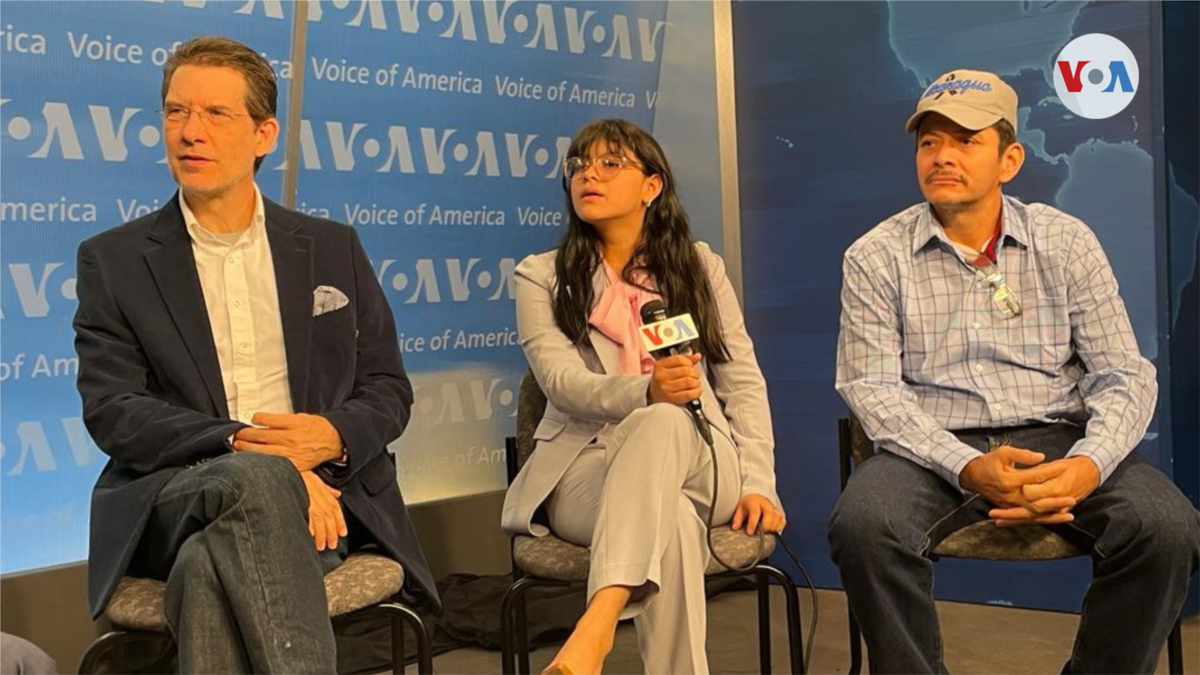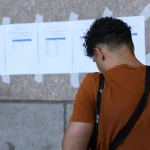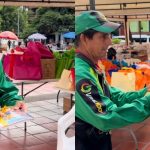To the 222 former Nicaraguan political prisoners released by the government of Daniel Ortega Last week, his release from prison and his immediate expatriation to the United States took them by surprise, where most are now adapting to a “difficult” exile for many, in which they say they will first have to “heal” and then continue fight for his country.
The former presidential candidate and general manager of the newspaper La Prensa, Juan Lorenzo Holmann Chamorro, the journalism student, Samantha Padilla Jirón, and the peasant leader Medardo Mairena, spoke this Thursday with the voice of america about their experiences during their incarceration and after their release, which they only learned about that same day.
“We didn’t know anything,” Holmann said of his expulsion from the country, which was accompanied by expatriation and the withdrawal of nationality for the more than 200 prisoners received by the US.
The 23-year-old student Samantha Padilla, among the youngest of the group of released opponents, assures that she did not have “time to think” about anything. “She was very excited hugging so many people that she couldn’t see for months, even years,” she recounted about her reunion with her classmates.
Among the 222 former political prisoners are opponents, presidential candidates, social activists, lawyers, journalists, priests and diplomats. The transfer operation to Washington is considered one of the largest operations of its kind in which the White House has participated.
“The assault was mental”
The three ex-prisoners recalled their time in the Ortega prisons as a hard time, a constant test, in which, at least in their case, they did not receive corporal punishment, but they did receive a lot of “psychological abuse.” They agreed that the isolation and lack of communication with their families was the worst they had to experience.
“We were never beaten, at least in my case and those who were with me, the aggression they did was emotional, mental,” said Holmann, who served more than a year in prison for his open opposition to the Ortega government.
For his part, Medardo Mairena insisted that the prosecution never found “financing evidence” that he had supposedly received for protesting and even so “they found him guilty.” The peasant leader recounted how he stopped seeing his little daughter for “a year and a half.”
“Our families also suffered psychological torture” similar to those of those who were imprisoned, emphasized Medina, who confessed that he “took refuge in prayer”, like many of his companions, to stay strong.
The opponent insisted that “the only thing we were doing was protesting to defend the human rights” of his and his compatriots. “They took the street from us, but not our fight,” he said.
“I keep having nightmares that I’m in jail”
Mental health and the possible consequences after imprisonment was another of the topics addressed by the three released opponents during the discussion.
“Currently we cannot know to what extent it affected us. Right now I don’t feel like I need psychological support, but I know that this is going to manifest itself in some way,” warned Samantha Padilla, who confessed that she still has trouble sleeping. “I keep having nightmares that I’m in jail,” she admitted.
For the opponents it is very important now “to take the time to recover,” they said.
“I’m going to take some time off to share it with my family, with mine and let’s say heal the wounds a bit and heal the mind a bit. I don’t know what I’m going to do, but I’m going to try, not to try, I’m going to to do it: to have quality time with my family, with my daughters, and give myself that little break and then think about what I’m going to do and how I’m going to do it,” said Juan Lorenzo Holmann.
The former presidential candidate reflected on the future. “Exile is always difficult, and even more so when this exile is helped by exile (…), but I think they are things that we have to overcome, and we are going to overcome them,” he assured.
Links to The Voice of America
Holmann, journalist and manager of the newspaper La Prensa, one of the main media outlets in Nicaragua; He also emphasized the role of communicators inside and outside the Central American country, among the latter the voice of america.
“My relationship with VOA It is an interesting topic, I was born in Managua, but I was raised in a town called San Juan del Sur, a port on the Pacific. There the radio did not reach very well, so what my mother did is that she had a short wave radio and every day in the morning she turned the radio on to listen to the Voice of America. I woke up every day with that greeting,” she recalled.
For Holmann, the “link with the VOA it’s something personal”, so when he saw the correspondents when they arrived in the US “memories of childhood came back to him”.
Samantha Padilla was detained for her activism and for writing anti-government opinion pieces in Nicaragua. The journalism student stated that when she was arrested she had a mask with the logo of the voice of america.
She explained that even though she told them that she had no direct relationship with VOA, that this was a means of communication, a photo of her “with a VOA cap” was used against her in the trial to show that she was seeking to subvert the peace and order in the country.
The heart set in Nicaragua
The three opponents took the opportunity to send messages of support and strength to the opponents who are still in the country. On the same day the 222 prisoners were released, it was announced that another two of those who were going to be released refused to travel and for the moment remain in Nicaraguan prisons, among them Nicaraguan Bishop Rolando Álvarez.
They also called for “caution” and urged those who remain there to protect themselves, because opposition activism “cost us our freedom, but others their lives,” said Samantha Padilla.
The student called for using social networks as a tool to mobilize, in addition to highlighting the role of exile in the fight for human rights in Nicaragua.
“Something good has come out of this, many independent media have come out in Costa Rica, in other countries, which are doing an excellent job,” Padilla was pleased.
For his part, Medardo Mairena stressed that even if they are far away, they will not stop fighting. “The priority is our family but even so, our little heart continues in Nicaragua, because I believe that Nicaragua needs us. Nicaragua has suffered too much and we wanted to be part of the solution to what is happening,” he insisted.
Connect with the Voice of America! Subscribe to our channel Youtube and activate notifications, or follow us on social networks: Facebook, Twitter and instagram.
















